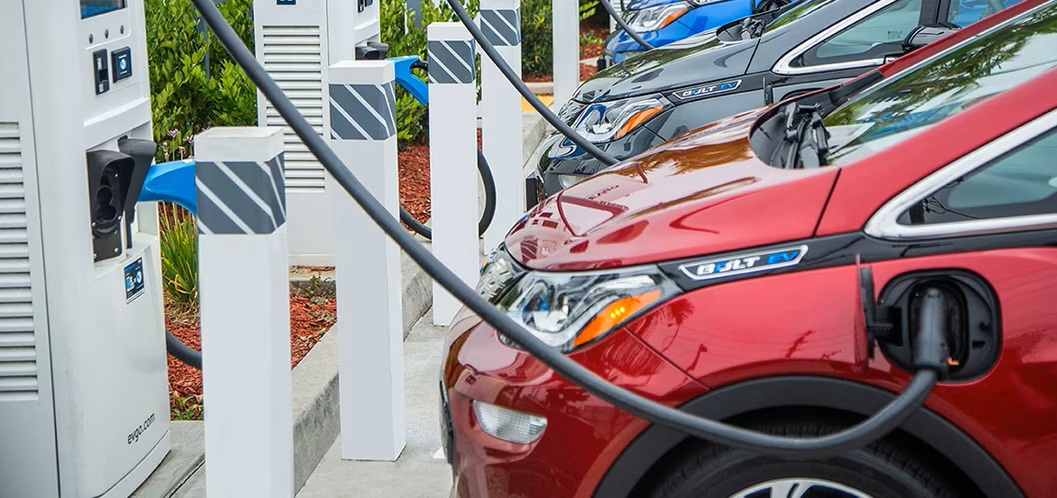As a part of the 2nd anniversary of the Inflation Reduction Act, nearly 350 Climate Mayors announced a commitment to electrify at least 50% of municipal fleets by 2030 while increasing electric vehicle (EV) chargers by at least 500%, with at least 40% of the charging infrastructure benefitting disadvantaged communities.
This collective effort is a pivotal move to meet the Biden-Harris Administration’s goal to make 50% of all new vehicle sales electric by 2030.
Sending a major market signal to auto and light duty truck manufacturers, the commitment comes on the ten-year anniversary of Climate Mayors, which was first launched in 2014 by three U.S. mayors coming together to galvanize local leaders to act together on climate change.
With the commitment, the mayors pledged to bring cleaner air and green jobs to their cities by supporting the growth of EVs, investing in infrastructure, increasing public charging stations, and accelerating fleet electrification.
“This announcement will deliver a range of benefits: cost savings for residents, cleaner air, and a lot of good jobs. The Biden-Harris Administration is proud to support these mayors in ensuring that the EV revolution plays out on efficient, affordable, and equitable terms for American drivers and American workers,” says U.S. Transportation Secretary Pete Buttigieg.
“This is what strong local leadership looks like. I am so proud of these mayors. They’re driving change in their communities by getting creative with historic federal funding and designing smart policies and new partnerships,” states Gina McCarthy, first White House National Climate Advisor, former U.S. EPA Administrator, and Managing Co-Chair of America Is All In.
“As Chair of Climate Mayors, I’m excited by our collective commitment to electrifying 50% of city fleets across the entire network,” indicates Mayor Justin M. Bibb, Mayor of Cleveland, OH and Chair of Climate Mayors.
“Building on 10 years of climate leadership, Climate Mayors is entering into our next decade with even bolder commitments to address the greatest threat of our time – climate change,” says Kate Wright, Executive Director of Climate Mayors.
“Today the Climate Mayors continue their leadership in sending clear market signals to OEMs for growing demand for EVs while accelerating the electrification of fleets to reduce emissions and operating costs for municipalities,” states Matt Petersen, Board Chair of Climate Mayors.
“This historic commitment to EV fleets and charging builds on the Climate Mayors’ 2017 RFI issued to auto and truck manufacturers showing that 112,000 vehicles across 30 cities worth over ten billion dollars could be electrified, and the 2019 EV Purchasing Collaborative helping cities to procure EVs and plan for charging infrastructure—as a result, cities are continuing to lead on reducing emissions for healthier communities, creating green jobs, and growing the clean energy economy,” he adds.
The U.S. transportation sector is the single largest source of carbon pollution, accounting for 29% of total greenhouse gas emissions; transitioning to electric vehicles has the potential to rapidly decrease the country’s emissions.
And there is market momentum in the shift to electrification, with nearly 17 million new fully electric and hybrid vehicles expected to be sold worldwide in 2024.
By transitioning municipal fleets to EVs and expanding public charging infrastructure, cities can decrease harmful pollution from internal combustion engine vehicles, create green jobs, save taxpayer money, reduce the country’s dependence on fossil fuels, and foster an environment that encourages consumer choice for electrification beyond municipal fleets.
With the announcement, Climate Mayors is ensuring cities can effectively respond to EV growth and build infrastructure that encourages widespread adoption of electric vehicles.
The commitment also launches around the second anniversary of the Inflation Reduction Act, a historic piece of legislation for climate action.
The pledge will take advantage of the pathbreaking opportunities the Inflation Reduction Act and Bipartisan Infrastructure Law provide to build cleaner, more equitable and prosperous communities.
Climate Mayors will work with its member cities to accelerate municipal fleet electrification and charging infrastructure by providing policy, technical, and analytical resources to achieve these goals.
This will include developing formal partnerships with manufacturers and national clean financing institutions funded by the Greenhouse Gas Reduction Fund.
These partnerships will bridge the gap between private capital and municipal needs.
Climate Mayors will also work with the Biden-Harris Administration and federal agencies to access funding and usher in a new era of clean transportation in cities.
The announcement builds on Climate Mayors’ longstanding commitment to local climate action and advancing accessibility to EVs and EV charging stations in U.S. cities.
In 2017, Climate Mayors found that across 30 cities 112,000 vehicles could be electrified, providing a signal to manufacturers on potential increased market demand.
In 2019, Climate Mayors launched the EV Pooled Purchasing Collaborative (EV Collaborative) to help cities electrify their fleets and plan for EV charging; since then, over 250 municipalities, counties, transit agencies, port authorities, and colleges and universities have committed to purchasing over 4,000 EVs.
“By working together across party lines, Climate Mayors can achieve significant progress toward a safe, sustainable, and prosperous future,” says John Giles, Mayor of Mesa, AZ.
“Our collective commitment to accelerate electrification of our municipal fleets demonstrates the power of partnership when striving to meet our climate goals,” indicates Satya Rhodes-Conway, Mayor of Madison, WI and Chair Emerita of Climate Mayors.
“With over 100 light duty EVs in our fleet and 62 all-electric buses on the streets in Madison, we’re all about breaking barriers in order to bring cleaner air and green jobs to our cities,” she adds.
“With the help of federal grants, we’ve been able to jump start our transition to cleaner transportation options. The City of Columbia is proud to double down on our efforts through this commitment to secure a healthier environment for all our residents”, indicates Barbara Buffaloe, Mayor of Columbia, MO.
“In Seattle, we’re taking a multi-pronged approach centered around the needs of our residents and community members to ensure EV use and charging is accessible for all. We are launching dozens of new curbside charging stations, offering rebates for charging in multi-family buildings, and expanding businesses’ use of cargo bikes for urban delivery,” states Bruce Harrell, Mayor of Seattle, WA.
“Electrifying municipal fleets and building our charging infrastructure is key to building a green economy in Redmond. By investing in sustainable transportation alongside fellow Climate Mayors, we not only reduce emissions but also lay the foundation for new opportunities for innovation and sustainability in our community,” indicates Angela Birney, Mayor of Redmond, WA.
“As Mayor of Fayetteville, I am proud to share our commitment to the adoption of electric vehicles and the expansion of charging infrastructure in our city,” says Lioneld Jordan, Mayor of Fayetteville, AR.
“As we commemorate the 10-year anniversary of Climate Mayors, the City of New Orleans reaffirms its dedication to a sustainable and resilient future. By prioritizing electric vehicles (EV), we are not only improving air quality and public health but also serving as a role model in climate mitigation strategies for other cities to follow. Federal funding and support have enabled us to accelerate our City’s Climate Action Plan goals to reduce our transportation emissions, making it easier to implement innovative solutions and technologies” states LaToya Cantrell, Mayor of New Orleans, LA.
“To achieve our Climate Action Plan goal to reduce community-wide greenhouse gas emissions 45 percent by 2030, the City of Edina is transitioning its municipal fleet to electric, hybrid and biodiesel vehicles in effort to reduce our municipal emissions,” says James Hovland, Mayor of Edina, MN.
“As we strive to combat climate change, embracing electric vehicles citywide is a crucial step forward,” states Ted Wheeler, Mayor of Portland, OR.
“As a champion for clean energy, I am proud to support the Climate Mayors’ collective network electrification goals. Miami-Dade County is leading by example as we work to electrify our County fleet by 2030, from our daily operations vehicles to our buses. We are currently operating one of the largest zero-emissions electric bus fleets among public transportation agencies in the country. We are also installing EV chargers throughout our community, with a goal of converting 30% of vehicles in our community to electric power by 2030, and we just launched one of the nation’s most aggressive rollouts of shore power at PortMiami, connecting up to five cruise terminals,” indicates Daniella Levine Cava, Mayor of Miami-Dade.







